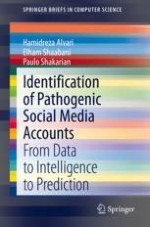2021 | OriginalPaper | Buchkapitel
2. Characterizing Pathogenic Social Media Accounts
verfasst von : Hamidreza Alvari, Elham Shaabani, Paulo Shakarian
Erschienen in: Identification of Pathogenic Social Media Accounts
Aktivieren Sie unsere intelligente Suche, um passende Fachinhalte oder Patente zu finden.
Wählen Sie Textabschnitte aus um mit Künstlicher Intelligenz passenden Patente zu finden. powered by
Markieren Sie Textabschnitte, um KI-gestützt weitere passende Inhalte zu finden. powered by
